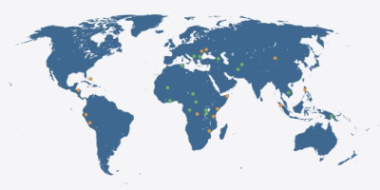Transparency and Accountability

Public trust and confidence in justice sector institutions is key to investment and commercial transactions, and necessary for sustainable development and social change. IDLO is engaged in programming that enhances the integrity and capacity of such institutions to promote good governance by holding State and other constituencies, including the private sector, accountable, ultimately leading to people’s confidence in the laws and institutions that are meant to serve them.
IDLO Gender Strategy: Access to justice for women and girls
Kyrgyz judiciary’s IT branch tests new court software
New software for automated distribution of civil, economic and administrative cases is being tested by the Supreme Court of the Kyrgyz Republic, aimed at simplifying case assignment among judges, reducing corruption and facilitating fairer, more efficient case handling.
IDLO Director-General to visit Ukraine: Media Advisory
Kyiv, October 24, 2017 - The Director-General of the International Development Law Organization (IDLO), Irene Khan, will visit Ukraine from October 25 to 27, 2017 to meet representatives of the Government of Ukraine and other key stakeholders in the rule of law sector to discuss IDLO’s work and explore areas of potential future collaboration.
Integrity and anti-corruption in the Philippines
With rapidly growing economic and social sectors, the improvement of its justice system is key to the Philippines securing the status of a newly developed country. IDLO has been implementing a program in the Philippines to enhance the competency of prosecutors with a view to increasing the successful disposition of cases against public officials and efficiently addressing corruption.

Ukraine: Public services one-stop-shop opens in Kharkiv
The most advanced yet Public Service Center has opened in Ukraine’s second-largest city Kharkiv, currently providing over 400 administrative and social services through the one-stop-shop concept that has previously proven successful in Odessa and Mariupol.

E-evidence in Indonesia: A new frontier in anti-corruption
Electronic evidence is progressively becoming a key component in corruption cases in Indonesia. Gradually, e-mails, recordings, text messages and social media posts are presented as evidence that can make or break a case.

Kenya court decision demonstrates respect for rule of law
September 1, 2017 – Today’s decision by the Kenya Supreme Court demonstrates that the Kenyan Judiciary can effectively and efficiently handle electoral disputes in line with the Constitution, said the International Development Law Organization (IDLO).
“The ruling is a clear demonstration of why supporting the independence of the Judiciary and investing in building judicial capacity, including to resolve electoral disputes, builds the democratic process.”
Anti-corruption through Ukraine Service Centers
For decades, the public sector in Ukraine had been considered deeply corrupt and oftentimes, dysfunctional. Nepotism was an accepted source of both employment and promotion. Applying for and receiving administrative services was usually an exhausting and intimidating experience that could only be avoided through paying bribes.
In response, IDLO has continued to support decentralization and anti-corruption in Ukraine through the establishment of new Public Service Centers (PSCs).
IDLO Director-General to visit Kenya to discuss electoral justice and gender equality
Media Advisory: Interview Availability. Nairobi, April 27, 2017 - The Director-General of the International Development Law Organization (IDLO) will visit Kenya from May 3 to 5, 2017 to discuss electoral justice, gender equality and the rule of law with representatives of the Government of the Republic of Kenya, the judiciary, the legislative, diplomatic community, civil society and the women’s movement.
Pages
Key Initiatives
-
 Despite the positive momentum from Ukraine’s justice sector reforms, there has been a lack of court judgments in top corruption cases, underscoring the need for greater institutional efficiency, transparency and independence in the process of prosecution. As corruption cases often involve complex financial schemes with elements of money-laundering, there is a strong need to delegate them to a specialized court. In response to these needs, the High Anti-Corruption Court was formally established on April 11th, 2019.
Despite the positive momentum from Ukraine’s justice sector reforms, there has been a lack of court judgments in top corruption cases, underscoring the need for greater institutional efficiency, transparency and independence in the process of prosecution. As corruption cases often involve complex financial schemes with elements of money-laundering, there is a strong need to delegate them to a specialized court. In response to these needs, the High Anti-Corruption Court was formally established on April 11th, 2019. -
IDLO has been working with the Kyrgyz Judiciary to support the establishment of a functional, credible and transparent legal system, since the adoption of the 2010 Constitution. Despite many positive developments, the rule of law sector has faced a number of problems – chief among them inadequate financing, which risks undermining judicial independence and makes access to justice a challenge, as well as transparency and accountability.
-
Access to judicial decisions, including commercial law decisions, whether for Tajik judges, lawyers, or representatives of international investors, is currently highly limited, due to a lack of a publicly accessible database. This impacts the ability of all parties to refer to past case law in making decisions — whether judicial or commercial.
-
In Burundi, land tenure registration is the primary way for the government to deal with the large number of land disputes across the country. A series of pilot programs aimed at resolving land rights issues have been initiated in recent years. To date, however, it is unclear whether these pilot programs have had their intended effect of reducing the number of land disputes.
Latest Activity
|
Publication
|




